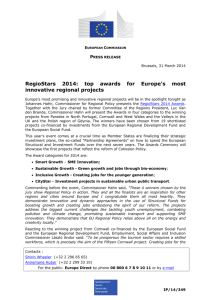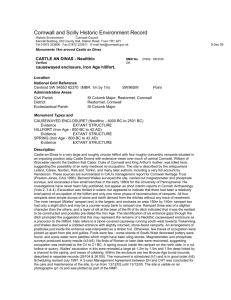Budget summary
advertisement
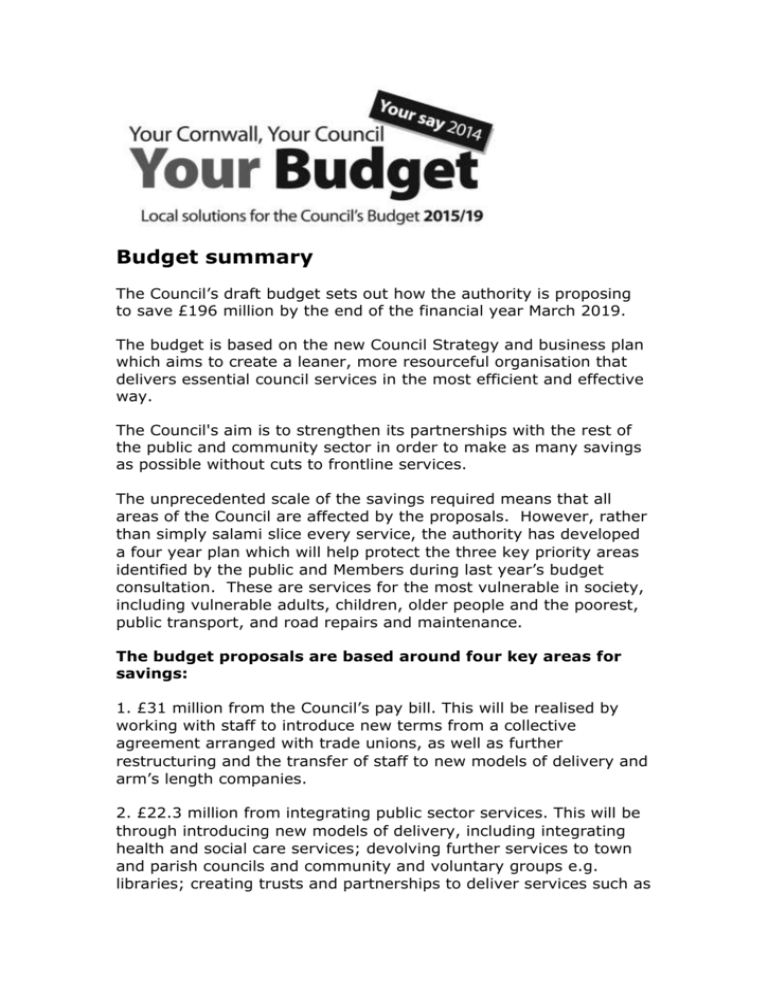
Budget summary The Council’s draft budget sets out how the authority is proposing to save £196 million by the end of the financial year March 2019. The budget is based on the new Council Strategy and business plan which aims to create a leaner, more resourceful organisation that delivers essential council services in the most efficient and effective way. The Council's aim is to strengthen its partnerships with the rest of the public and community sector in order to make as many savings as possible without cuts to frontline services. The unprecedented scale of the savings required means that all areas of the Council are affected by the proposals. However, rather than simply salami slice every service, the authority has developed a four year plan which will help protect the three key priority areas identified by the public and Members during last year’s budget consultation. These are services for the most vulnerable in society, including vulnerable adults, children, older people and the poorest, public transport, and road repairs and maintenance. The budget proposals are based around four key areas for savings: 1. £31 million from the Council’s pay bill. This will be realised by working with staff to introduce new terms from a collective agreement arranged with trade unions, as well as further restructuring and the transfer of staff to new models of delivery and arm’s length companies. 2. £22.3 million from integrating public sector services. This will be through introducing new models of delivery, including integrating health and social care services; devolving further services to town and parish councils and community and voluntary groups e.g. libraries; creating trusts and partnerships to deliver services such as culture and tourism, and seeking external partners for services such as parking. 3. £23 million from more effective procurement and contract management. This saving will be made through management improvements, including delivering more services digitally and through the Council’s website; reducing administrative costs in areas such as information technology and postage; more effective procurement and contract management and sharing buildings with partners and community groups. Another £20 million of inflationary pressures is proposed to be absorbed on top of the £23 million identified and £6.9 million from the rationalisation of buildings and open spaces. 4. £28.6m through the generation of additional income and trading services and taking a more commercial approach in areas such as public protection, licensing, planning, and waste. Through a combination of the above and other actions the Council estimates that out of the total savings figure some £83 million will ultimately be derived from efficiencies. In addition the Council has identified a number of services to a value of at least £34 million that could potentially be taken on by Town and Parish Councils and voluntary and community. The actual delivery of these savings will only be known after detailed negotiations with interested groups. The Council’s Portfolio Advisory Committees are considering the budget proposals, in detail, during September. Have your say There are a number of ways people can let us know their views of the budget proposals. We are holding public meetings in October; information about the meetings is available in our calendar of public budget meetings. There is also a comment form available from our libraries and one stop shops. It can also be completed online on our website: www.cornwall.gov.uk/cornwall budget. You can use the form to let us know: 1. Your views on the draft budget proposals and how they may affect you. 2. About any new ideas you have on how we can save money. 3. About any ideas you have on how we can save money in areas we have already proposed. Our budget consultation will close on 29 October 2014. All the comments and suggestions we receive from the public and our partners will be used to produce a revised draft of the budget, which will be discussed by the Council’s Cabinet on 5 November and then the full Council will consider the proposed budget on 22 November when it will make a final decision about the budget. John Pollard, the Leader of the Council and Alex Folkes, the Cabinet Member for Finance and Resources have said they are determined to focus on what Cornwall will be like in 2019, rather than what we need to cut. John Pollard has said: Budgetary constraints and the changing nature of Local Government require a different approach and, as we said last year, we want to build a resilient and sustainable Cornwall and not simply reduce the services we provide. To this end we have worked with Councillors, officers and partners to develop this budget, the Council’s strategy which underpins it, and a Business Plan which will implement it. Our commitment is to create a leaner, more resourceful organisation that delivers essential council services in the most efficient and effective way. This also means having the courage to make some extremely difficult decisions. John continued: We have been pressing the Government to change the way local government is funded to give Cornwall a fairer share of the money it allocates to councils to provide services. We currently receive less than half the money per head of population than that given to Hackney and if we were funded in the same way as an average urban council we would receive an additional £48 million a year. We are continuing to have discussions with Ministers over the need to recognise the cost of providing services to people in Cornwall and have recently sent a submission setting out how we think the system should be reformed to the Independent Commission that has been set up to look at this issue. Alex Folkes has said: Over the past few months we have looked closely at everything we do to see how we can protect services by becoming more efficient and changing the way the Council is run. We started with the money we spend on ourselves and have already identified more than £30 million of savings through a radical restructure of senior management, reducing the use of consultants and agency staff by 59%, and a local pay agreement with staff. This work is continuing, with further savings due to come from ongoing restructuring and the sale of surplus buildings, but the sheer scale of the savings we need to make means we cannot rely on these actions alone. Alex continued: We are looking to work much more closely with the rest of the public sector and the voluntary and community sector. We will be seeking to integrate our services and to share support functions and buildings wherever possible. But we know that front line services will also be hit. We recognise that many people will be concerned at the impact of some of these proposals but the stark truth is we cannot protect services and save £196 million by continuing in the same way. Faced with the need to save £196m from our budget our choice is limited. We have to become more efficient and change the way we run the Council. By doing this we can support key services for vulnerable children and adults, and help people who are struggling to make ends meet by maintaining council tax support. We will also be supporting the bus network and continuing to fix potholes and maintain our roads. More information is available on our website: www.cornwall.gov.uk/cornwallbudget
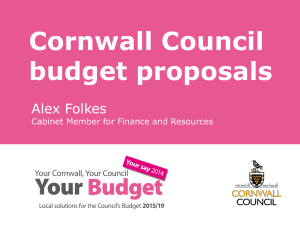
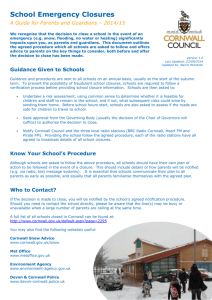
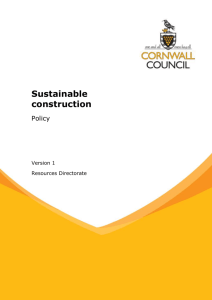
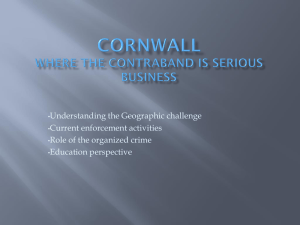
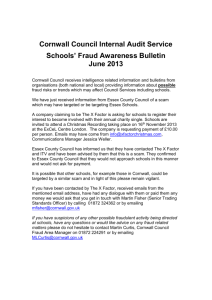
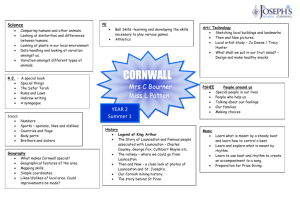
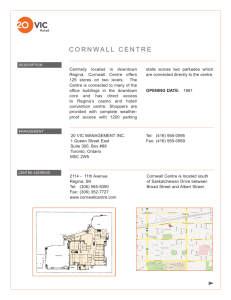
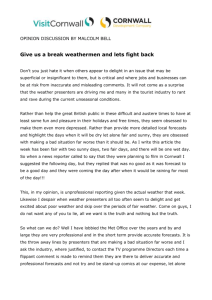
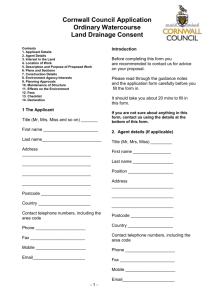
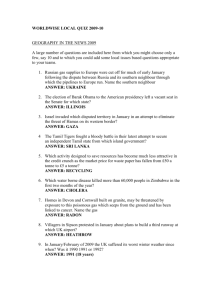
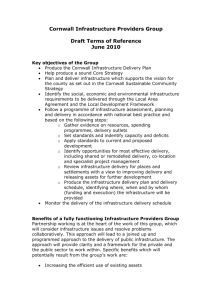

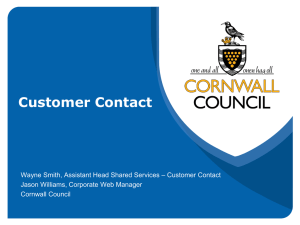
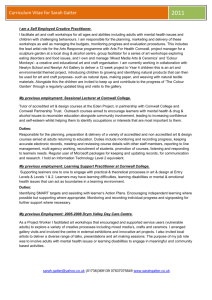
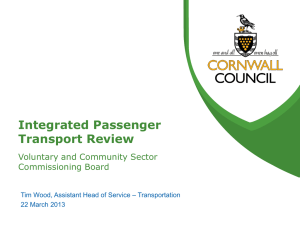



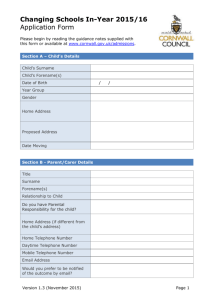
![Kentisbeare to Padstow - A Theory [of Butson migration]](http://s3.studylib.net/store/data/007532038_2-dcbef7dc337c2b51e29f57437d1bfd88-300x300.png)
